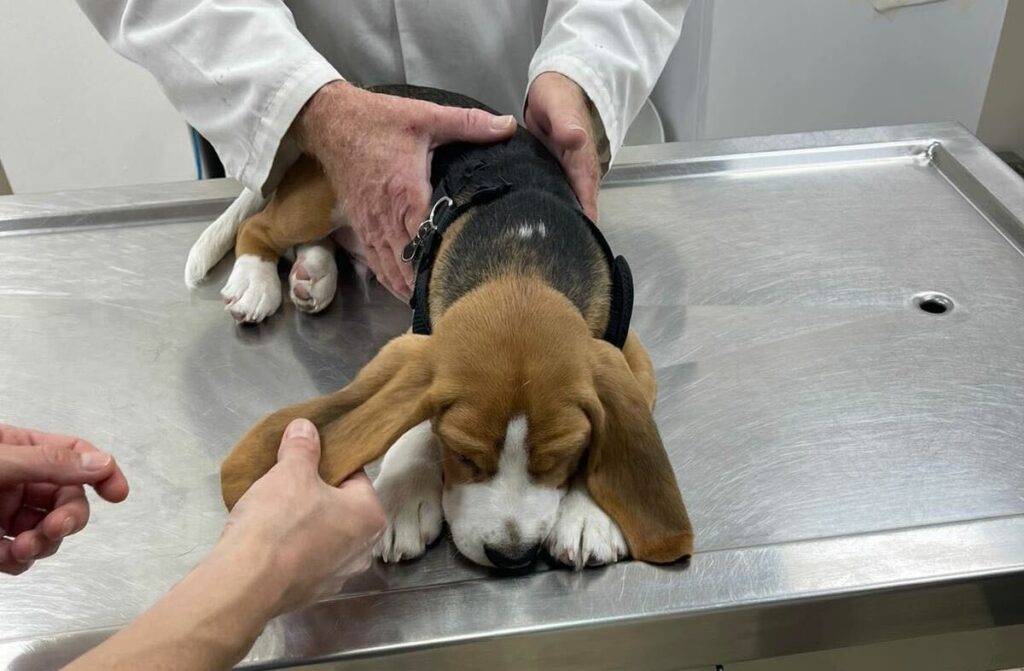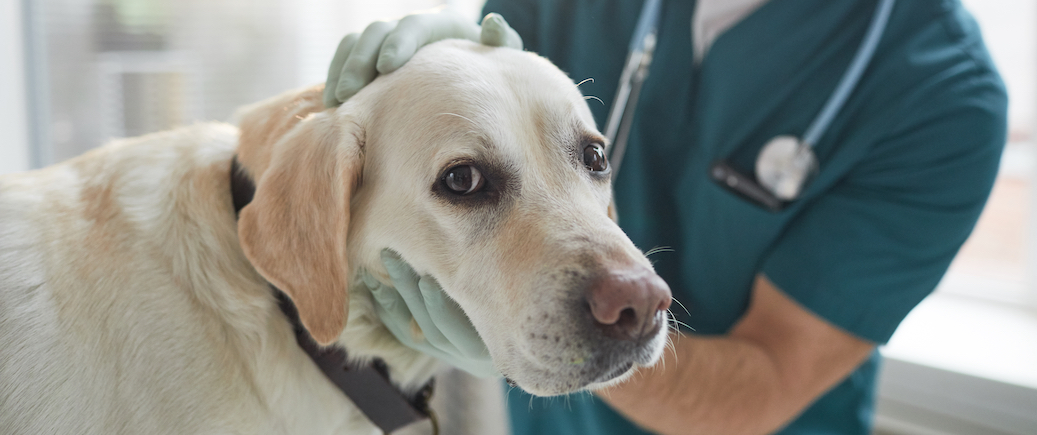Trips to the vet are a standard part of being a responsible dog parent and keeping your pup at their happiest and healthiest.
But how often does your dog really need to go to the vet? The frequency of those appointments will vary throughout your dog’s life, from puppyhood through their senior years.
Knowing what to expect can help guarantee that your best friend gets the care they need.
How often should I take my dog to the vet?
At a minimum, no matter your pup’s age, plan to take your dog to the vet at least once a year for an annual checkup. Depending on your dog’s age and health, you might need to make additional visits.
Let’s break it down by age.
How often should I take my puppy to the vet?
If you’re caring for a newborn puppy, it’s a good idea to bring them in for an initial checkup at around six weeks (as well as Mom, if she’s in the picture). Puppies can get very sick very quickly. The vet can make sure the puppy is healthy overall, and can weigh and measure them, tracking their growth in those crucial early days and weeks.
After that, plan to make repeat visits to the vet for your puppy’s vaccination series. Your puppy should have their first vaccine appointment around eight weeks, and will have two more appointments every three to four weeks after that. Once your puppy is 16 weeks old, they will likely be fully vaccinated. Make sure to reward them with a treat (puppuccino, anyone?).
During those vaccine appointments, your vet will also monitor your puppy’s overall progress. This is also the perfect time to start your puppy on heartworm and flea and tick prevention. Your vet can also provide advice about housebreaking and diet, and will answer any of the many questions you probably have.
As your puppy ages, you’ll want to think about getting them spayed or neutered, a common procedure that has clear health benefits. Your vet can recommend the ideal timing for this appointment based on your puppy’s breed and age. Most of the time, your puppy will be spayed or neutered when they’re around six months old.

How often should I take my adult dog to the vet?
Once your dog is a year old, they’re considered an adult. Time flies! Rather than seeing the vet every few weeks, most adult dogs see the vet just once a year for an annual wellness checkup.
During that yearly checkup, your vet will evaluate your dog’s health. Some vets might ask you to bring a stool sample so they can check for intestinal parasites. Your vet will give booster shots that are due, and will check your dog for fleas and ticks. Your best friend will also need to hop on the scale, and your vet will let you know if your pal might need to gain or lose a few pounds.
If you have any concerns about your dog’s health, your vet may run some additional tests, which could include blood work.
Your vet will also check your dog’s dental health, and might suggest an additional appointment for a dental cleaning or even a tooth extraction. Some dogs need these appointments annually, while others may be able to go years without a dental cleaning. Your vet can give you tips on how to maintain your best friend’s dental health at home with dental toys, chews, and even tooth brushing. (Dogs, they’re just like us!)
Keep in mind that if your dog is sick or has an ongoing health issue that needs attention, like diabetes, you will need to bring them into the vet more frequently.
How often should I take my senior dog to the vet?
We know you’ll always think of your dog as a puppy, but on average, depending on size and breed, once your dog hits seven years old, they’ll be considered a senior—and they’ll need to see the vet more often.
Older dogs have a higher chance of developing some serious health diseases and conditions like arthritis, kidney and liver disease, and even cancer. Taking your dog to the vet more often gives your vet a chance to identify and get ahead of these health issues with the right treatment or management plan.
If your senior dog is healthy, your vet will probably ask you to bring your best friend in for checkups twice a year. During these appointments, your dog will receive a physical and your vet might do blood tests to check for some of these common health problems. Your vet will monitor your dog’s eyesight and hearing and will likely ask you questions about their energy levels and eating habits.
When should I take my dog on an emergency trip to the vet?
If your dog gets sick or is injured outside of your vet’s usual office hours, you might find yourself in a tricky spot: Head to the emergency animal hospital, or wait it out? If you call the emergency clinic and describe your dog’s symptoms, a vet may be able to tell you if your dog needs to be seen ASAP, or if it’s safe to postpone a visit until your vet’s office is open.
That said, these are some symptoms that reliably indicate your dog is experiencing an emergency and does need veterinary help right away:
- Labored or trouble breathing
- Extreme lethargy or collapsing
- Seizures
- Broken bones
- Abdominal pain that lasts for 30 minutes or more
- Many vomiting episodes that happen within just a few hours
- Inability to urinate
- Extreme panting or heatstroke
- Limb paralysis
- Crying or yelping when touched, which indicates your dog is in extreme pain
It’s also important to head to the vet if your dog has been in an accident or if your pup has eaten something toxic, no matter the symptoms they’re displaying.
How much does a vet visit cost for a dog?
The cost of a vet appointment will depend on your specific vet’s rates, where you’re from, and of course based on the services that your dog needs. Keeping that in mind, the table below includes price ranges of some common services that your doggy might receive.
| Dog Veterinary Service | Common Cost Range |
|---|---|
| Basic vet visit | $45 to $55 |
| More extensive physical exam | $100 to $300 |
| Heartworm testing | Around $50 |
| Ear care appointment and medication | $120 to $150 |
| Fecal exam | $25 to $50 |
| Internal parasite treatment | $400 to $1,000 |
| Dental care | $500 to $1,000 |
| Spaying and neutering | $250 to $2,000 |
| Geriatric tests | $85 to $110 |
| Vaccinations: DAPP or DHPP, Rabies, Bordetella (Kennel Cough), Leptospirosis, Lyme Disease, and Influenza | $15 to $50 each |
If you’d like a more in-depth explanation of these common dog care costs, check out our detailed guide here. Keep in mind that by keeping up with many of these recommended services, like regular fecal tests and heartworm preventatives, you may be able to avoid having to pay for much more expensive treatments later, like heartworm and internal parasite treatments.
If you’re feeling a bit overwhelmed by all of these veterinary care costs, we understand! Keeping your fur fam healthy can be expensive.
We never want the fear of maxing out your credit card to be the reason you dread a vet visit.
Pet health insurance for dogs can be an economical way to recoup many expenses you might encounter at the vet. For instance, Lemonade offers a Preventative, Preventative+, and a Puppy/Kitten Preventative package. Depending on your pet’s age, these packages may cover vital things like spaying/neutering, vaccinations, microchipping, and flea and tick preventatives.
And your base Lemonade policy will be useful in the case of unexpected accidents and illnesses, including big ticket treatments that you might otherwise not be able to afford.
It’s always a good idea to get your dog a policy early in life, before they develop any pre-existing conditions. Click below to get started—it only takes a few minutes.
Before you head out for a game of fetch…
Whether you’re thinking of adopting a dog or buying your first puppy from a reputable breeder, it’s important to plan ahead for the vet appointments that your new fur fam member will need. Vet care costs can quickly add up, and you’ll need to make sure that you have room in both your schedule and your budget for the vet care your pup needs.
Keep in mind that the above costs reflect typical expenses if things go right. You’ll also want to plan out how you’ll handle a veterinary emergency if your dog ever needs urgent and more expensive care.
Pet health insurance is a great way to ensure that you’re always financially prepared to give your furry friend the health care that he needs. Learn more about what does pet insurance cover and why it could be a great investment for your pup’s health.





